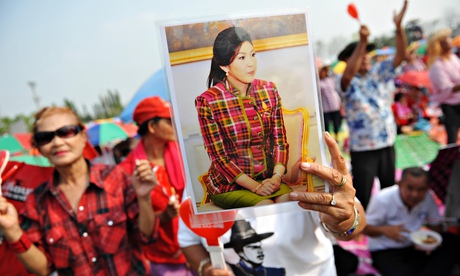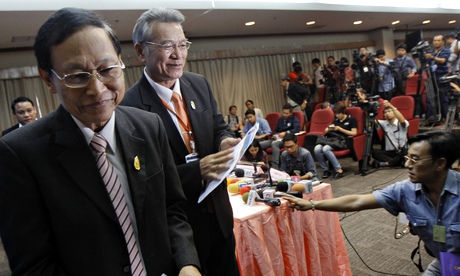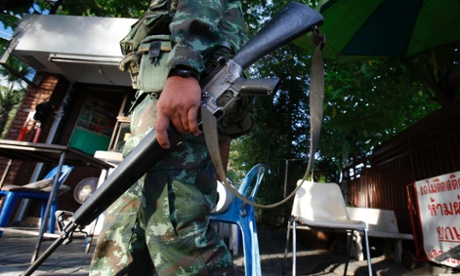"Usually, in the past, we would have had a coup by now," said one retired senior Thai official this week about his country's travails. He didn't mean the absence of a coup marked progress; he was reflecting a widespread resignation that without action by some external force – such as the military – the crisis being played out in Bangkok risked running the country into the ground.
Thailand faces truly existential challenges. It is riven by social, economic, ideological and regional divisions. Resignation seems to give way only to heightened extremism; vituperative intolerance has damaged any prospect of talks. Outside powers should not misinterpret a lull in the streets as progress. Without a concerted attempt to alter course, Thailand remains at risk of tipping into violent confrontation.
How did things come to this? The government called elections for 2 February after protests led by former members of the Democrat party persuaded the prime minister, Yingluck Shinawatra, to withdraw an inflammatory amnesty bill that would have annulled the 2008 abuse-of-power conviction of her brother, former prime minister Thaksin Shinawatra. Instead of channelling the dispute into the political arena, protesters occupied Bangkok's streets, calling for Yingluck's resignation and an appointed government.
Boycotted by the Democrat party, boycotted and disrupted by anti-government protesters, the February poll had no cathartic effect. Yingluck's administration continues to face pressure from protests, the courts and nominally non-partisan watchdog agencies. Indeed, the constitutional court today voided the elections, throwing yet more uncertainty on an already confused situation. But an appointed government – an ever more likely proposition – would almost certainly provoke a backlash by "red shirt" Shinawatra supporters, who have seen every government they elected since 2005 undemocratically removed.
Just off-stage, and far more significant to Thailand's immediate future than either Yingluck or her street-based opponents, are three sets of characters.
First, there is Thaksin: to some, a politician who finally gave voice to the aspirations of the rural north and northeast; to others, a Voldemort-like figure who, even in exile, is omnipresent, able and willing to sacrifice the nation to his limitless ambition. Few express a middle line but many miss the fundamental dilemma. Whatever his virtues or sins, Thaksin, politically active, will remain a source of extreme division; but the converse – that his removal will bring union – does not hold up. Thaksin is both cause and symptom of Thailand's irreversible political reality: it is the north and northeast, rather than Bangkok, the Thai establishment and the south, that have the electoral clout to determine who is in government.
Second, the military. They're not shy about politics – in 2006 they ousted Thaksin – or in stamping down protests, as they did with extreme prejudice against red shirts in 2010. Currently, their intentions remain unclear. Burned by experience of recent interventions, they may want to stay on the sidelines but are unlikely to if they believe their core interests, or the integrity of the state, are in jeopardy.
And, finally, the monarchy, discussion of which is circumscribed by vigorously enforced lèse majesté laws. The elderly king's health renders unlikely his intervention in the current crisis. Most royalists loathe Thaksin and are anxious about succession. Partisan appeals for royal intervention have helped to undermine perceptions of the monarchy as above politics. Long a byword for national stability, the monarchy finds itself constrained from playing a mollifying role, on the cusp of a new era amid much uncertainty.
So what's the answer to Thailand's dilemma? The opposition demands reform before elections; the government the reverse. Squaring this circle demands compromise. Protesters need to accept that the views of a majority as expressed at the ballot box cannot systematically be overturned by the minority. The government, its supporters and Thaksin need to accept that long-term stability requires that their opponents' concerns be addressed.
An agreement might work as follows. The democratic process should be upheld and Yingluck permitted to form a government, ideally drawn from a base broader than just her party. Recognising the country's divide, she could commit to staying in power for one year while a national dialogue takes place. Such a dialogue, which would need to be both balanced and truly reflective of all interests, could air the country's ills, whether over the rule of law, corruption, growing regionalism or even the separation of powers. Yingluck's administration should culminate in a referendum on a new constitution paving the way for fresh elections. The crown and the military could endorse such choreography.
What Thailand needs are friends, domestic and international, to help it confront, not gloss over, the country's deep fissures. Seeking absolute victory, wrapped in a cloak of righteous principle, is not working. It is pushing Thailand ever closer to a precipice. Time, now, to try compromise and dialogue.









